|
|
|
Sort Order |
|
|
|
Items / Page
|
|
|
|
|
|
|
| Srl | Item |
| 1 |
ID:
148155
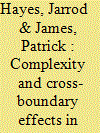

|
|
|
|
|
| Summary/Abstract |
If one trend characterizes the study of foreign and security policy over the past several decades, it may be the search for concepts that assist in addressing the complexity of global politics.2 We embrace that complexity and reimagine security as a social phenomenon that interweaves between social collectives, bleeding across boundaries and tying collectivities together as they seek to reconcile different systems of security meaning-making. At its core, security is a socially constructed system for making sense of danger and threat (Buzan et al. 1998). Thinking about security as a phenomenon of linked social constructions opens the field of inquiry up to a massive amount of complexity and interactivity. We offer two concepts as a possible basis for thinking about the ways in which security systems interact with and influence the operation of other security systems: multidirectionality and anticipated reaction.
|
|
|
|
|
|
|
|
|
|
|
|
|
|
|
|
| 2 |
ID:
118417
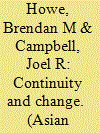

|
|
|
|
|
| Publication |
2013.
|
| Summary/Abstract |
In this article, we address four common, often contradictory misconceptions concerning Japanese foreign and security policy. First, Japan's strategic "normalization" is dangerous. Second, Japan is incapable of having a "normal" policy. Third, Japan is about to become "normal." Fourth, foreign and security policy under the Democratic Party of Japan (DPJ) will differ radically from what it was for fifty years under the Liberal Democratic Party (LDP). We contend that Japan is not a threat; that it has a security policy, but not one that fits well with Western models; and that Japan's security policy is changing, gradually not radically, and is not becoming just like the West's.
|
|
|
|
|
|
|
|
|
|
|
|
|
|
|
|
| 3 |
ID:
147920
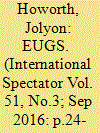

|
|
|
|
|
| Summary/Abstract |
There is much in this interview that merits comment, but I will stick to four basic issues: Brexit; the 2003 European Security Strategy (ESS) vs the 2016 European Union Global Strategy (EUGS); strategic autonomy; resilience in the neighbourhood.
|
|
|
|
|
|
|
|
|
|
|
|
|
|
|
|
| 4 |
ID:
142978
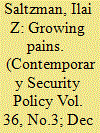

|
|
|
|
|
| Summary/Abstract |
The rise of China has attracted considerable scholarly attention since the early 1990s. Recent developments in Japan leave no doubt, however, that close attention to Tokyo's changing foreign and security policy also is in order. In a break with tradition, the government of Prime Minister Shinzō Abe's approved in 2014 a new interpretation of Article 9 of the Japanese Constitution, facilitating the shift from basic self-defence to collective self-defence that allows Japan to assume greater regional and global security assertiveness and responsibility. This article examines the trajectory of Japan's security policy transformation, focusing on the causes and nature of this dramatic reorientation. By applying a neoclassical realist framework, the article traces the intricate interplay between shifts in Japan's strategic environment, domestic politics and the security policy decision-making process. Abe and the hawkism he represents will undoubtedly face Herculean hurdles in the future. Still, continued external challenges will inevitably force Tokyo to ‘normalize’ its security policy and shed off the remaining relics of its pacifism and anti-militarism. The article also concludes that the significant inducements driving Japanese security normalization are challenged by powerful domestic opposition. While the process will remain piecemeal rather than revolutionary, the course of Japan's security policy favours continued self-assertion, emancipation and reform.
|
|
|
|
|
|
|
|
|
|
|
|
|
|
|
|
| 5 |
ID:
177668
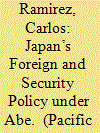

|
|
|
|
|
| Summary/Abstract |
Using Samuels’ [(2007). Securing Japan: The current discourse. The Journal of Japanese Studies, 33(1), 125–152] political categories of Japanese perspectives on strategic policy, this article argues that the nation’s foreign and security policy under the leadership of Prime Minister Shinzo Abe has undergone three distinct phases: a first phase of neoconservatism during his first tenure as Prime Minister from 2006 to 2007; a second period when he returned to the office of Prime Minister five years later in 2012 that can be described as neoautonomous; and a third phase of pragmatic realism from 2015 to 2016. In addition, this article analyses the factors driving change from one phase to another. By adopting an eclectic approach to theory, it claims that each traditional theory in the field of International Relations (IR) offers different but complementary causal effects to shifts in security and foreign policies. Each IR theory emphasizes or downplays these four factors: actors, structures, material forces and ideas. This article will employ all three IR traditional theories as they relate to these factors to discern the change factors of Abe’s foreign policy. Finally, it concludes by siding with those scholars who assert that Japan’s foreign policy has made a consequential break from its past and has embarked on a new path towards a remilitarization of its foreign and security policy.
|
|
|
|
|
|
|
|
|
|
|
|
|
|
|
|
| 6 |
ID:
166746


|
|
|
|
|
| Summary/Abstract |
EU defence policy has been extremely popular over the past three decades, averaging around 75% public support. In fact, no other policy domain is as popular and robust as the idea of pooling national sovereignty over defence. However, public support for EU defence has been dismissed as mere “permissive consensus”, rather than genuine support. Scholars have often assumed that public opinion towards European integration is passive and shallow, especially over foreign policy issues, where the public has limited understanding of the complexity of issues. Consistent with contemporary findings about the complexity of comparative foreign policy attitudes, the authors contest the permissive consensus logic and demonstrate that European publics have held coherent preferences over the use of force at the European level. The authors conclude that the slow progress of integration in this area is due to the reluctance of elites rather than to the reticence of Europe’s citizens.
|
|
|
|
|
|
|
|
|
|
|
|
|
|
|
|
| 7 |
ID:
140562


|
|
|
|
|
| Summary/Abstract |
This article examines Poland's national potential and its international position within the European Union (EU) with respect to security issues. It presents research results based on a comparison of Poland's national potential as it relates to other EU countries, which is useful when evaluating Poland's power within the EU. The article also evaluates Poland's crisis potential, i.e. it identifies those factors that may potentially be treated as threats to national and regional security. Finally, it enables the identification of challenges to Poland's security in the second decade of the twenty-first century. The research is conducted according to a multidimensional comparative analysis, which is perceived by the author as the best available to measure a country's power despite its weaknesses.
|
|
|
|
|
|
|
|
|
|
|
|
|
|
|
|
| 8 |
ID:
108782
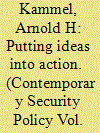

|
|
|
|
|
| Publication |
2011.
|
| Summary/Abstract |
Since the early days of the Common Foreign and Security Policy and the European Security and Defence Policy, the EU has always paid special attention to developments in the Western Balkans and therefore declared them a strategic priority for European external action. Thus, it is not surprising that the first missions in the framework of ESDP were deployed to this region. Considering the deployment of civilian crisis management missions to the Western Balkans a first step in the shaping of a strategic culture and based on the assumption that the European Union clearly possesses the prerequisites to form such a strategic culture, the following chapter will analyse the development of civilian crisis management and chronologically describe and evaluate the four civilian missions carried out in the Western Balkans. The conclusion is that despite the fact that ESDP is still a work in progress, the engagement in civilian crisis management missions already provides a marker for the existence of an emerging European strategic culture in the process of formation.
|
|
|
|
|
|
|
|
|
|
|
|
|
|
|
|
| 9 |
ID:
139324


|
|
|
|
|
| Summary/Abstract |
A common assumption in the West is that distance and space are no longer key considerations in strategy and politics. ‘Over there’, the argument goes, can quickly and dangerously become ‘over here’. Yet, as Patrick Porter contends, this is a dangerous fallacy that distorts Western strategy. A proper consideration of the role of distance should not lead to disengagement or isolation, but rather to a more selective and considered – and thus more flexible – foreign and security policy.
|
|
|
|
|
|
|
|
|
|
|
|
|
|
|
|
|
|
|
|
|